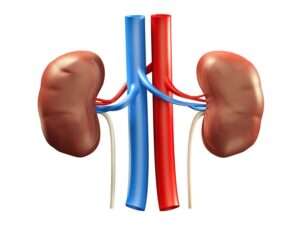Kidney Disorders

In Ayurveda, kidney disorders are described in the context of imbalances in the doshas (Vata, Pitta, and Kapha) and the impact on the functional aspects of the kidneys. The kidneys, known as “Vrikka” is considered as vital organs responsible for the excretion of waste products, regulation of electrolytes, and maintenance of overall fluid balance in the body. Ayurveda recognizes various kidney-related conditions and emphasizes a holistic approach to restore balance and promote renal health.
Introduction to Kidney Disorders in Ayurveda:
1. Role of Doshas:
– Ayurveda attributes kidney disorders to imbalances in the doshas, with specific doshas contributing to different aspects of renal dysfunction. For example:
– Vata Imbalance: Can lead to conditions like renal colic, difficulty in urine passage, and irregular kidney function.
– Pitta Imbalance: May manifest as conditions like burning sensations during urination, inflammatory disorders, or changes in urine color.
– Kapha Imbalance: Can contribute to conditions involving excessive fluid retention, kidney stones, and urinary tract congestion.
2. Ama (Toxins) Accumulation:
– The accumulation of ama, or undigested toxins, is considered a significant factor in kidney disorder. Poor digestion and metabolic imbalances can lead to the formation of ama, impacting the kidneys.
3. Mutravaha Srotas Involvement:
– Ayurveda views the urinary system, or Mutravaha Srotas, as a channel responsible for the transport of urine. Imbalances in this channel can lead to various kidney-related issues.
Common Kidney Disorders in Ayurveda:
1. Ashmari (Kidney Stones):
– The formation of stones in the kidneys, ureters, or bladder. Ayurveda classifies kidney stones based on doshic involvement and prescribes treatments to dissolve or eliminate them.
2. Mutrakrichra (Dysuria):
– Painful or difficult urination, often associated with imbalances in Vata and Pitta doshas.
3. Prameha (Urinary Disorders):
– A broad category covering different types of urinary disorders, including excessive urination, bed-wetting, and other abnormalities in urine.
4. Vrikka Shotha (Renal Edema):
– Swelling or edema in the kidneys, often associated with imbalances in Kapha dosha.
5. Vrikka Roga (General Kidney Disorders):
– A term encompassing various kidney-related conditions, including infections, inflammatory disorders, and functional disturbances.
Now we will look in detail about following kidney disorders – Its Ayurvedic perception and management.
Kidney Stone
Any type of Kidney stone, Stone in bladder or ureter. Painful urination. Bleeding through urine. Hydro nephrosis
Elevated Urea, Creatinine Level
Kidney Function Test may shows irregularity in levels of creatinine and urea. It is necessary to correct Kidney fucntions as soon as possible
